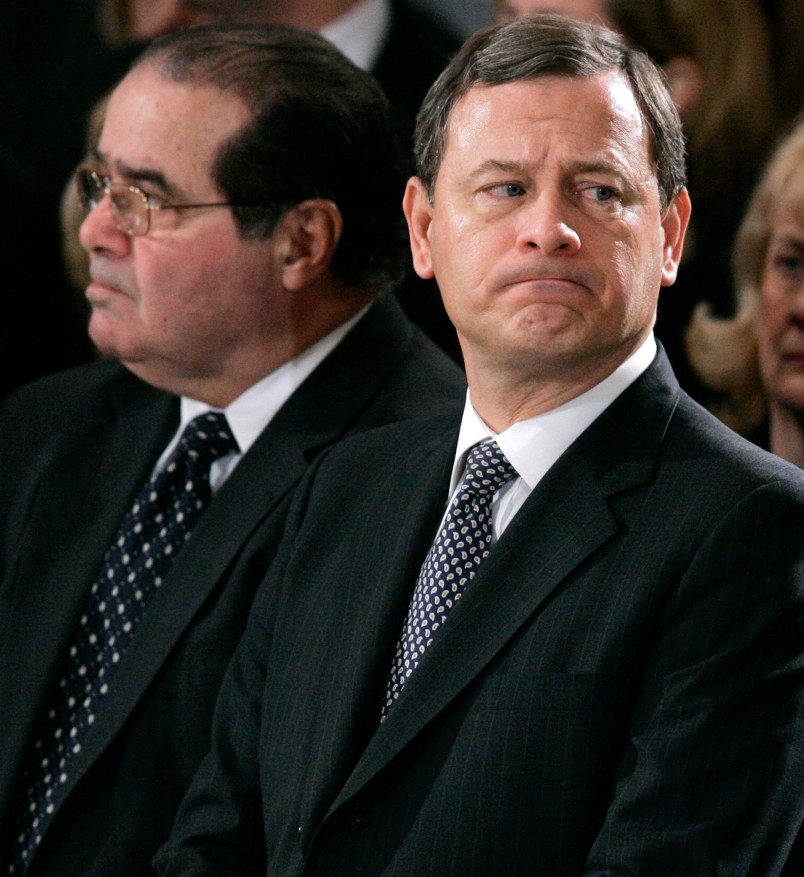WASHINGTON (AP) — A divided Supreme Court ruled Wednesday that states can ban judicial candidates from personally asking for campaign contributions, in a decision aimed at protecting the impartiality of elected judges.
The justices’ 5-4 ruling means that restrictions on soliciting campaign cash can remain in place in 30 states that elect state and local judges. In all, 39 states hold elections for judges and some allow personal appeals fordonations.
Chief Justice John Roberts, in a rare break with fellow conservatives, said in his majority opinion that laws barring judicial candidates from personally asking for campaign cash do not run afoul of First Amendment free speech rights. He said the state has a compelling interest “in preserving public confidence in the integrity of the judiciary.”
“Judges are not politicians, even when they come to the bench by way of the ballot,” Roberts wrote. “A state may assure its people that judges will apply the law without fear or favor — and without having personally asked anyone for money.”
The court’s four liberal justices joined Roberts in the majority.
In a sharp dissent, Justice Antonin Scalia called the Florida rule a “wildly disproportionate restriction upon speech” that should be struck down under the First Amendment.
Roberts, who has written other major First Amendment decisions protecting speech rights, might at first glance be a surprising fifth vote to uphold the limits on judicial fundraising. He also previously sided with conservatives in the court’s 2010 Citizens United decision that freed corporations and labor unions from some limits on campaign spending.
But this case could be seen to bring out his role as the leader of the judicial branch, even if he and other appointed federal judges are not affected by the case. Roberts at several points drew a distinction between candidates for judgeships and other offices. The ruling took note of concerns that lawyers, in particular, might have a hard time refusing to contribute when a judge personally asks for campaign money.
Scalia noted in his dissent that the high court in recent years has used the First Amendment to protect depictions of animal torture, sale of violent video games to children and people who lied about having won military medals.
“It’s no great mystery what is going on here,” Scalia wrote. “The judges of this court … evidently consider the preservation of public respect for the courts a policy objective of the highest order. So it is — but so too are preventing animal torture, protecting the innocence of children, and honoring valiant soldiers.”
In a separate dissent, Justice Anthony Kennedy said he wanted to “underscore the irony in the court’s having concluded that the very First Amendment protections judges must enforce should be lessened when a judicial candidate’s own speech is at issue.”
The case of Lanell Williams-Yulee of Tampa, Florida, arose after she signed a mass mailing asking for money for hercampaign for a local judgeship and posted the letter on her website. The appeal didn’t bring in a penny, but Williams-Yulee received a public reprimand for violating a Florida Bar rule that bans candidates for elected judgeships from personally soliciting donations.
Lawyers for Williams-Yulee had argued that the rule has a chilling effect on political speech and does nothing to prevent a candidate’s campaign committee from requesting contributions.
Lower courts have been split on the issue in the Florida case.
The justices had previously struck down limits on what judicial candidates can say during campaigns. In 2002, thecourt struck down rules that were aimed at fostering impartiality among judges and barred candidates for elected judgeships from speaking out on controversial issues.
But in 2009, the court held in a case from West Virginia that elected judges could be forced to step aside from ruling on cases when large campaign contributions from interested parties create the appearance of bias. Roberts dissented in that case.
The Campaign Legal Center, a campaign finance reform advocacy group, praised the decision, but said it was disappointed that “what the court rightly finds untenable in the judicial context — responsiveness to campaigndonors — it would tolerate for legislative and executive candidates.”
The case is Williams-Yulee v. Florida Bar, 13-1499.
Copyright 2015 The Associated Press. All rights reserved. This material may not be published, broadcast, rewritten or redistributed.







"He said the state has a compelling interest “in preserving public confidence in the integrity of the judiciary.”
the irony is palpable…
Hear hear. (shaking head)
" “Judges are not politicians, even when they come to the bench by way of the ballot,” Roberts wrote. “A state may assure its people that judges will apply the law without fear or favor — and without having personally asked anyone for money.”"
Which implies that politicians can accept money in exchange for favors. Wow.
Yep - beat me to it.